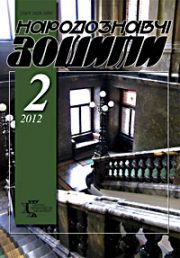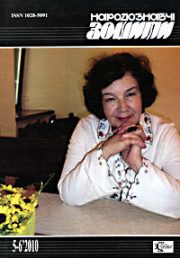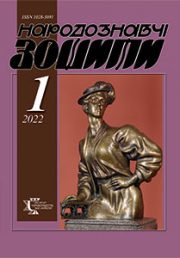The Ethnology Notebooks. 2021. № 5 (161), 1234—1246
UDK [76.071.1:097](477)”19/20″А.Пугачевський
DOI https://doi.org/10.15407/nz2021.05.1234
ROMANENKOVA Yuliia
- ORCID ID: https://doi.org/10.51209/platform.1.3.2021.259-293
- DSc in Arts, Professor,
- Chief of the Chair of Humanities of
- Kyiv Municipal Academy of Circus and Performing Arts,
- 88, Zhylyanska Str., 01032, Kyiv, Ukraine,
- Contacts: e-mail: Julia_Romanenkova@ukr.net
Abstract. Introduction. The article is dedicated to the creative work of the Ukrainian graphic artist, representative of the creative dynasty of the Kyiv school of printmaking Arkady Pugachevsky. The role of the artist ‘s personality in the general context of Ukrainian graphic art is highlighted, his contribution to the popularization of the Ukrainian book plate on the international art space is emphasized.
Problem statement. The main periods of the artist’s work, stages of his artistic activity as a graphic artist are characterized, his contribution to the formation of a new bookplate of independent Ukraine is actualized, the universalism of A. Pugachevsky’s creative personality is emphasized.
The purpose of the study is to put into official circulation the name of the artist, thanks to which domestic bookplates not only received a new stage of the history, but Ukraine became known as a significant center of the bookplate in the world, confirmed by numerous artist’s victories in foreign prestigious art competitions, which is proof of the recognition of his talent at the highest level.
To solve the aims of the article, the tools of historical, chronological, biographical, comparative methods are used, which allow to comprehensively characterize the formulated problems.
Results. With the help of the analysis of the creative work of the most characteristic stages of A. Pugachevsky’s work in the context of modern Ukrainian graphic arts, first of all — area of ex-libris, at the same time the place of the Ukrainian segment of graphic art in foreign art processes is covered.
Conclusions. The article is aimed at actualizing the creative work of Kyiv graphic artist A. Pugachevsky, his role in the presentation of Ukrainian printmaking in general in the international art space. The problem of insufficient recognition of the master in his own country crystallized, while the world art community succeeded due to his professionalism many years ago.
Keywords: printmaking, letterpress, plastic engraving, woodcut, bookplate, small plastic art, bronzе.
Received 7.09.2021
REFERENCES
- Romanenkova, Yu. (2021). The main tools of the artistic language of the Kiev graphic artist Arkady Pugachevsky. International scientific innovations in human life: mater. International. scientific-practical conf. (Pp. 368—375). Manchester: Cognum Publishing House [in Russian].
- Berdichevskiy, Y. (1977). The art of ex-libris. Our friend is a book (Pp. 60—77). Kyiv: Reklama [in Ukrainian].
- V’yunik, A. (1977). Ex-libris of Ukrainian artists. Kyiv: Mystetstvo [in Ukrainian].
- Nesterenko, P. (1992). Ukrainian ex-libris. Slovo i chas, 11, 84—88 [in Ukrainian].
- Nesterenko, P. (2010). Drawing in the art of ex-libris. Aktual’ni problemy mystets’koyi praktyky i mystetstvoznavchoyi nauky, 17, 48—54 [in Ukrainian].
- Nesterenko, P. (2016). History of the Ukrainian bookplate. Kyiv: Tempora [in Ukrainian].
- Mikhal’chuk, V. (2014). The main trends of the ex-libris actualization in the modern world art market. Visnyk Khar kivs’koyi derzhavnoyi akademiyi dyzaynu i mystetstv, 3, 70—75 [in Russian].
- Mikhalchuk, V. (2018). Ukrainian Ex-libris collectors: collections, names. Aktualni problem humanitarnykh ta pryrodnychykh nauk:materialy V Mizhnar. nauk.-prakt. konf. (Pp. 14—17).Kharkiv [in Russian].
- Mikhalchuk, V. (2014). Ex-libris as an object of collecting: the experience of modern Ukraine. Nauchniy aspect, 2, 92—104 [in Russian].
- Mykhalchuk V. (2021). Kyiv exhibitions of the early 1990s as the beginning of the revival of the Ukrainian book plate. Suchasni vyklyky i aktual’ni problemy nauky, osvity ta vyrobnytstva: mizhhaluzevi dysputy: mater. of XVIII International. scientific-practical conf. (Pp. 17—23).Kyiv [in Ukrainian].
- Romanenkova, Y. (2003). Ukrainian ex-libris of the last third of the XX century in the global context: the main evolutionary phases. AVIA-2003: mater. Of International. scientific-practical conf. (Pp. 102—105). Kyiv: NAU [in Ukrainian].
- Romanenkova, Y. (2015). Ukrainian ex-libris on the international arena of contemporary graphic arts. Mystetstvoznavstvo Ukrainy, 15, 111—118 [in Ukrainian].
- Romanenkova, Y. (2021). Book plate in the artistic culture of Ukraine at the turn of the XX and XXI centuries. Tekst. Kniga. Knigoizdanie, 25, 122—144 [in Russian].
- Romanenkova, J., Bratus, I., & Kuzmenko, H. (2021). Ukrainian Ex-Libris at the End of the 20th Century and the Beginning of the 21 st Century as an Instrument of the Intercultural Dialogue. Agathos, 1, 125—136.
- Romanenkova, J., Bratus, I., Mykhalchuk, V., & Gunka, A. (2021). Lvov ex-libris school as the traditions keeper of the intaglio printing techniques in the Ukrainian graphic arts at the turn of the XXth and XXIth centuries. Revista inclusiones, 8, 321—331.
- Tupik, V. (2017). The role of Ukrainian ex-libris artists in shaping of the competitiveness of Ukrainian graphic arts in the international arena. Molodiy vcheniy, 5 (45), 80—83 [in Ukrainian].
- Kamenetskaya, Yu. (2019). Contemporary Ukrainian ex-libris in the collection of the Frederikshavn Art Museum. East European Scientific Journal, 5 (45), 4—7 [in Russian].
- Kamenetska, Yu. (2019). Reflection of author’s style in bookplates of Ukrainian artists at international exhibitions-competitions in Brest. Kultura i suchasnist’, 1, 260—267 [in Ukrainian].






